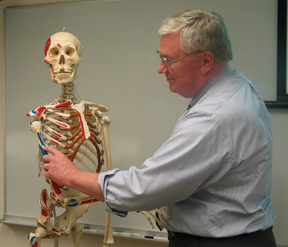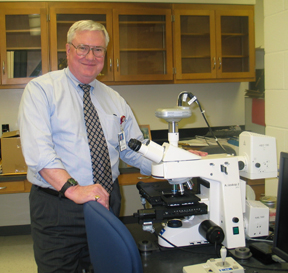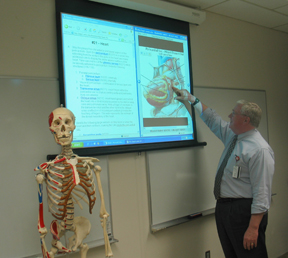 Gross anatomy is probably the toughest – and most important – course that medical students take. It truly builds the foundation for the rest of their career.
Gross anatomy is probably the toughest – and most important – course that medical students take. It truly builds the foundation for the rest of their career.
To successfully complete gross anatomy, students must absorb literally thousands of medical terms. It’s not easy, but if you have good teachers, the process becomes much easier.
That’s where Gordon Todd, Ph.D. comes in. He’s been teaching gross anatomy for 34 years. And – better yet – he’s very good at it.
So good, in fact, that he is one of four UNMC faculty members to win the Outstanding Teaching Award this year. Dr. Todd and the others will be honored at 4 p.m., April 25, at the Annual Faculty Meeting in the Durham Research Center Auditorium.
Dr. Todd teaches gross anatomy to medical students as well as physician assistant and physical therapy students. During his career, he has probably taught the course to more than 4,500 students.
|
|
“His contributions go far beyond quantity, the quality of his teaching is just as impressive as the hours he puts in,” said James Turpen, Ph.D., professor and vice chairman of UNMC’s Department of Genetics, Cell Biology and Anatomy. “Beyond that, people are uniformly amazed at how much additional service to the university he accomplishes. Dr. Todd is a warm and caring person. He always puts the perspective and interests of the students first.”
A native of Princeton, W.V., Dr. Todd’s father was a surgeon and his mother was a homemaker. After completing his master’s and doctorate degrees, Dr. Todd came to Omaha in 1972 as an assistant professor in the Creighton University School of Medicine’s Department of Anatomy. He held this post for three years before joining UNMC’s Department of Anatomy in 1975 as an assistant professor. He was elevated to associate professor in 1981.
“I learned under Ed Holyoke, Ken Metcalf and Bob Binhammer at UNMC,” Dr. Todd said. “They were superb educators. It rubs off on you. You can’t avoid it.”
 A self-proclaimed “technology freak,” Dr. Todd admits to having his own computer two years before IBM personal computers even came out. He has used his love for technology to make the UNMC gross anatomy course one of the most technologically advanced courses in the country.
A self-proclaimed “technology freak,” Dr. Todd admits to having his own computer two years before IBM personal computers even came out. He has used his love for technology to make the UNMC gross anatomy course one of the most technologically advanced courses in the country.
He headed a fundraising effort that netted $350,000 from the Olney Family Foundation, the College of Medicine and various alums of the UNMC College of Medicine, primarily the class of 1953, for upgrades to the gross anatomy and virtual microscopy labs. He then used the money to install 30 projection screens in the lab and linked them to computers. The screens are 50 inches wide and are located adjacent to the various worktables in the gross anatomy lab. He then scanned hundreds of images and passages from the course’s main textbook, “Atlas of Human Anatomy.”
With the click of a mouse, students can now instantaneously view photos or text from the textbook. In the past, the instructor would have to pass the anatomy atlas around the table, so the students could view up close the specific anatomical part being discussed. Much time is saved with the new system.
The change has been welcomed by students and has made UNMC’s gross anatomy lab one of the most advanced labs in the country. “Nobody has done it like we did it,” Dr. Todd said. “I’m convinced what we have here is the model for what a gross anatomy lab should be. It’s cost-effective and very efficient.”
His students concur. “I cannot overstate the improvement Dr. Todd’s project poses over the classic textbook and microscope approach,” said Mark Bazant, a second-year medical student. “The computer-based approach allows for a greater collaboration among students, as multiple students can simultaneously view slides and anatomical structures.”
Meaghann Shaw Weaver, a first-year medical student, said: “Dr. Todd is constantly updating and bettering the system to the benefit of students. When I made a recent suggestion to Dr. Todd regarding a particular Web site, the changes were updated that very day.”
 Teaching is all about connecting with students, and Dr. Todd knows how to connect. “Too often, I feel I spend my mornings taking notes in class simply to learn that information for the first time later that evening,” Bazant said. “A lecture by Dr. Todd, however, is organized in such a way that, though I won’t have memorized the specifics, I can walk away with a general framework that needs to be filled in.
Teaching is all about connecting with students, and Dr. Todd knows how to connect. “Too often, I feel I spend my mornings taking notes in class simply to learn that information for the first time later that evening,” Bazant said. “A lecture by Dr. Todd, however, is organized in such a way that, though I won’t have memorized the specifics, I can walk away with a general framework that needs to be filled in.
“Medicine is steeped in tradition, and at times I think there is a tendency to resist change in medical education – to teach in a way simply because that is the way you learned it. Often this approach is successful, but I don’t think this is how Dr. Todd operates. He seeks student input on different ideas he has. It demonstrates openness to suggestion and a willingness to change in order to work more effectively with students.”
One of Dr. Todd’s former graduate students, Neil Norton, Ph.D., is now an associate professor of oral biology and pharmacology at Creighton University. In his nomination letter, he wrote: “Dr. Todd has many outstanding qualities. However, first and foremost is his ability of making the most complex material seem easy. Gordon’s teaching ability is by far extraordinary. The passion Gordon has for his discipline is evidenced in every lecture he gives. There are very few people who love their work more than Gordon Todd.”
Todd and his wife, Claudianna, have been married for 38 years and have three grown children – two daughters, Ann and Sarah, and a son, Henry.
Gordon and Claudianna, who is coordinator of music for the Omaha Public Schools, have a strong interest in the arts. In addition, Gordon is an avid biker, logging more than 1,000 miles annually, and he is a former assistant Scoutmaster.
His biggest passion of all, however, is probably trains. His office features several train photos, and many times in his lectures, he will incorporate train slides to help better deliver his message.
“When I’m lecturing on the endocrine gland, I like to use a slide showing oil tank cars on a train,” he said. “Sometimes I think the subtlety of the slide gets lost on the students, but I think it does make a good analogy.”
At age 62, Todd said he hopes to keep “chugging” for several more years. His students hope so, too.